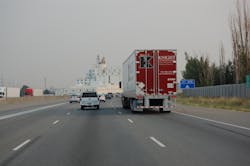Survey: Despite turmoil, trucking should be OK
Regardless of a rash of poor economic indicators, trucking executives remain “optimistic” that 2016 will deliver “solid growth” for their companies, according to a recent survey by Transport Capital Partners (TCP).
That being said, trucking’s “expectations” regarding their ability to win rate increases dropped the lowest levels in over five years, noted Steven Dutro, a TCP Partner.
"Expectations are lower than in recent years but are still positive for 2016,” he said in a statement. “The indication is for a stable business environment and little fear of a recession.”
Yet rate increases will be hard to come by, Dutro stressed.
“At the beginning of 2015, 79% of the participants in our survey were looking forward to rate increases over the year ahead,” he noted. “Turning the page into 2016, that number had dwindled to 41% – the lowest percentage we have recorded since 2009.”
That’s partly a result of slumping freight activity that began in the fourth quarter of 2015 and continues currently.
“During the fourth quarter we experienced a less robust freight environment when compared to the same quarter last year. The contracted portion of our freight volume remained relatively stable; however, non-contract opportunities were challenged by falling load counts and additional competition,” noted Dave Jackson, president and CEO of TL carrier Knight Transportation in the carrier’s year-end earnings report this week.
Paul Will, CEO of Celadon Group, observed a similar trend as well, as Celadon’s average revenue per tractor per week decreased $374, or 11.9%, to $2,775 in the fourth quarter of 2015 quarter compared to $3,149 in same period in 2014.
“This decrease is a result of a lackluster freight environment coupled with the significant growth in our seated tractor count,” he noted in Celadon’s earnings report this week. “In addition to initiating and implementing sustainable rate increases, we are continuing to work on cost reduction initiatives as we strive to improve our operating results."
That’s an example of “positive expectations remaining strong” among trucking executives, noted Richard Mikes, a TCP Partner, noting that 41% of motor carrier executives polled by TCP still expect their freight revenue rates to rise this year.
“In this survey, and in carrier discussions with TCP, we are seeing more variation in the opinions of individual carriers than in prior years,” Mikes explained. “Any further tightening, caused by a small increase in demand or driver shortages, will have a proportionally greater upward impact on spot and contract rates.”
Perhaps most telling of industry expectations for 2016, added TCP’s Dutro is that a strong majority – some 61% of carriers – expect to expand their fleets this year.
"Growth expectations are not quite as robust as they were in 2014 and 2015,” he stressed. “But, this number is still relatively consistent with the expectations – and the modest growth – of the past few years."
